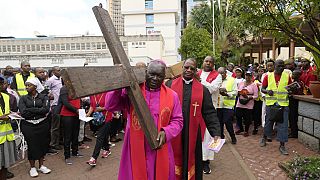Tedros Adhanom Ghebreyesus
WHO Director-General Tedros Adhanom Ghebreyesus was reappointed to a second five-year term on Tuesday by the U.N. health agency's member countries.
No other candidate challenged Tedros for the post amid the ongoing difficulties of responding to the devastating coronavirus pandemic.
"I am really grateful, I am very humbled for your confidence and trust," Tedros said.
Tedros, a former government minister from Ethiopia, has directed WHO throughout its management of the global response to COVID-19 and withstood occasionally withering criticism over its multiple missteps.
He is the first African to lead the agency and the only director-general not qualified as a medical doctor.
He is also the first WHO leader not to be supported by their home country; Ethiopia has previously accused Tedros of "misconduct" after his sharp criticism of the war and humanitarian crisis there and raised concerns about his leadership on Tuesday.
Under Tedros, the U.N. health agency failed to call out countries including China for blunders that WHO officials grumbled about privately, advised against mask-wearing for months, and said initially that the coronavirus wasn't likely to mutate rapidly.
Scientists drafted by WHO to investigate the coronavirus' origins in China said the critical probe was "stalled" last year, after issuing a report that even Tedros acknowledged had prematurely ruled out the possibility of a laboratory leak.
Tedros has frequently railed against rich countries for hoarding the world's limited supply of vaccines and insisted that pharmaceuticals aren't doing enough to make their medicines available to the poor.
Amid the near-universal focus on Ukraine after the Russian invasion, Tedros slammed the global community for not doing enough to solve crises elsewhere, including Yemen, Syria and Afghanistan, arguing that it was possibly because those suffering weren't white.
Still, critics say Tedros has failed on some fundamental issues, like holding staff accountable after allegations that dozens of outbreak workers managed by WHO sexually abused young women in Congo during an Ebola outbreak that began in 2018, in one of the biggest sex scandals in U.N. history.
None of the senior WHO managers alerted to the abuse allegations and who did little to stop the exploitation, have been fired.
In January, The Associated Press reported that staffers in WHO's Western Pacific office filed an internal complaint accusing regional director Dr. Takeshi Kasai of abusive, racist and other misconduct, undermining efforts to stem the spread of COVID-19. In response, Tedros said an investigation into the allegations had been launched and promised to act "with urgency."
But last week, several WHO staffers wrote to the agency's Executive Board complaining that Kasai "has been able to continue his unethical, abusive and racist conduct without any form of restriction." In an email to staff, Kasai disputed the charges.











Go to video
Africa CDC endorses Morocco's Mpox test
01:15
WHO: Mpox cases in South Kivu may be 'plateauing', but DRC seeing a 'general rising trend' in cases
01:37
78 patients evacuated from Gaza for care abroad
01:08
Mpox: Nine most affected countries to receive vaccines
00:57
WHO reports record 8 million TB cases last year
Go to video
Germany's disease control center reports 1st case of new mpox variant